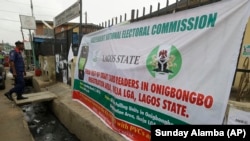Even by the bare-knuckled, often murky standards of Nigerian politics, the audio recording, leaked to the Nigerian media, was a bombshell.
The 37-minute tape, which appeared on an English-language news Web site in early February, purported to be of a meeting last June involving top military officials and elected leaders in the southern state of Ekiti.
Recorded by an artillery brigade captain, the officials can be heard discussing ways to suppress votes for the incumbent governor, a member of the opposition, in the June election. “[I] am not here for a tea party, [but] on special assignment by the President,” says one voice later identified as a former minister of state for defense.
The candidate from President Goodluck Jonathan’s ruling party ended up defeating the incumbent.
The recording burst into the public awareness on Feb. 5, just days before crucial national elections, causing waves in political circles and elsewhere. It also renewed fears that Nigeria’s military could be poised to interfere with the vote, which was later rescheduled to March 28 due to security concerns.
Jonathan, a Christian from the southern Niger Delta, is now locked into a tight election race with Muhammadu Burhari, a Muslim from the north and former military officer who led the country briefly during a period of military rule in the 1980s.
With Nigeria’s checkered history of coups and countercoups, some officials worry that the country could be on the verge of a new period of active military involvement in politics.
Garba Shehu, a top spokesman for Buhari’s All Progressives Congress, was blunt in his assessment of the Ekiti vote: his party did not lose.
"Rather the high command, the highest level of government in Nigeria, clearly gave directives to the supervisory security elements, the army,” he said. “The minister [of state] did not mince words – that he was acting on the orders of the president."
With Boko Haram’s insurgency in the north turning into a leading campaign issue for the two candidates, observers are closely watching the armed forces for signs they may be preparing to get openly involved in the election.
An Opening For The Military?
Darren Kew, a professor at the University of Massachusetts, Boston, and longtime expert on Nigerian politics, said Jonathan’s party may have given the military an opening into politics when it asked for a guarantee of national security on the eve of the Feb. 14 vote.
According to Kew, the Jonathan administration pressured the military to say it couldn’t provide adequate security. Officials then postponed the vote until March 28.
"What concerns me is it opens the door for the military to begin to play some kind of arbitration role in political conflicts among the parties,” he said. “This is exactly the pattern that led to the downfall of democracy in Nigeria and elsewhere on the continent over the last four or five decades.
“This is the beginning of the politicization of the military in the current crisis over the elections; once you bring them into politics they tend to have their own ideas on how the crisis should be managed,” he said.
Jonathan’s office has denied involvement in manipulating the Ekiti vote. And the federal government and military have so far refused to investigate.
A spokesman for the People’s Democratic Party in Ekiti said the tape was manipulated to show the party in a bad light.
Major General Chris Olukolade, a spokesman for the Nigerian armed forces, suggested that the leak was aimed at stoking alarm.
"The Nigerian military is professional, apolitical and is very conscious of its role as mandated by the constitution," he said. "The military did not postpone the election but we have a duty to analyze the security situation. [In contrast], the duty to do anything related to the election is not that of the military but of the electoral bodies or stakeholders. How then do you want the military to take responsibility for that decision?"
"Those who are trying to cause alarm with a view to prevent the involvement of security agencies in ensuring law and order during the elections are the ones who must explain what their problems are," he said.
Limited role
Opposition members and some observers, said they were wary of the involvement of the military and security forces.
Olukolade noted the decision to postpone the polls was made by civilian politicians, and that the military’s role is only to help maintain law and order. Anyone saying otherwise, he said, was trying to cause trouble.





